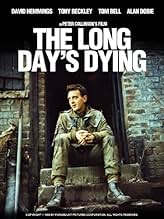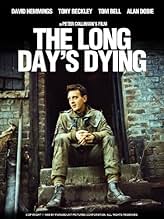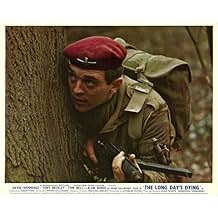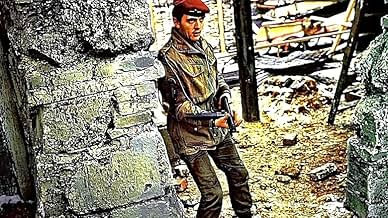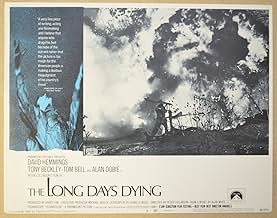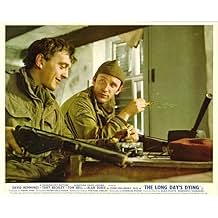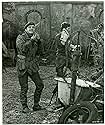IMDb RATING
6.5/10
545
YOUR RATING
The saga of three British soldiers and their German captive as they trek through the European countryside.The saga of three British soldiers and their German captive as they trek through the European countryside.The saga of three British soldiers and their German captive as they trek through the European countryside.
- Awards
- 2 wins total
- Director
- Writers
- All cast & crew
- Production, box office & more at IMDbPro
Featured reviews
In his third film, director Peter Collinson gives us this very unusual antiwar offering. A lost film that is very rarely screened nowadays, and completely unavailable on video or DVD, The Long Day's Dying is one of those movies that divides the majority of viewers into two camps - there are those who hail it as a cult classic and a film of tremendous power, and there are those who find it irritating and unappealing in the extreme. One of the most experimental things Collinson has done in this film is to use very little spoken dialogue; instead most of the talk is provided by voice-overs telling us what is going through a character's mind at a given moment. So, for example, when David Hemmings is creeping up behind a German soldier but cannot bring himself to cold-bloodedly shoot the man in the back, his thoughts are heard in voice-over as he thinks: "You're dead and you don't even know it. Now turn around. TURN AROUND!"
Three British paratroopers find themselves stranded in a deserted building somewhere in the European countryside during WWII. We learn that they were instructed to hide in the building and keep watch for advancing Germans, with a promise from their sergeant that he would return for them later to take them back to the rest of their unit. The trio consists of pacifist John (David Hemmings), violent Cliff (Tony Beckley) and the quiet but clear-thinking Tom (Tom Bell). However, several hours have gone by since the sergeant was supposed to relieve them, and the three are now beginning to grow anxious. Their plight worsens when a three-man German patrol happens by. The British paratroopers kill two of the Germans but the third - Helmut (Alan Dobie) - is only injured and becomes their prisoner. Now that their location is compromised the trio decide that their safest bet is to find their unit by themselves, so they set off with their prisoner on a trek through the countryside in search of their allies....
The Long Day's Dying is full of quiet understatement, with many moments where the camera lingers long on the faces of the protagonists. Even a small grin, a frown, or a hard swallow is very deliberate and is meant to be significant. The actors do a good job at getting across these subtle, almost imperceptible emotions. The story itself is rather dull, with little taking place over the 95 minute running time. One assumes that the film is some kind of allegory, with the handful of characters used as a microcosm - a small-scale representation, if you like - of the wider picture that was the Second World War. The violence is infrequent, but when they come the scenes of death and injury are very gory and show with grim realism the terrible things that weapons and booby traps can do to the human body. I found The Long Day's Dying a bit disappointing, as I couldn't get past the allegorical pretensions and the relentlessly unorthodox approach. But I certainly wouldn't pan it in the way that most professional critics have (Variety, Halliwell, Maltin, et al all hated this film). It's an unusual and very different sort of war film that some viewers - (admittedly, I'm not one of them) - will find interesting, powerful and thought-provoking.
Three British paratroopers find themselves stranded in a deserted building somewhere in the European countryside during WWII. We learn that they were instructed to hide in the building and keep watch for advancing Germans, with a promise from their sergeant that he would return for them later to take them back to the rest of their unit. The trio consists of pacifist John (David Hemmings), violent Cliff (Tony Beckley) and the quiet but clear-thinking Tom (Tom Bell). However, several hours have gone by since the sergeant was supposed to relieve them, and the three are now beginning to grow anxious. Their plight worsens when a three-man German patrol happens by. The British paratroopers kill two of the Germans but the third - Helmut (Alan Dobie) - is only injured and becomes their prisoner. Now that their location is compromised the trio decide that their safest bet is to find their unit by themselves, so they set off with their prisoner on a trek through the countryside in search of their allies....
The Long Day's Dying is full of quiet understatement, with many moments where the camera lingers long on the faces of the protagonists. Even a small grin, a frown, or a hard swallow is very deliberate and is meant to be significant. The actors do a good job at getting across these subtle, almost imperceptible emotions. The story itself is rather dull, with little taking place over the 95 minute running time. One assumes that the film is some kind of allegory, with the handful of characters used as a microcosm - a small-scale representation, if you like - of the wider picture that was the Second World War. The violence is infrequent, but when they come the scenes of death and injury are very gory and show with grim realism the terrible things that weapons and booby traps can do to the human body. I found The Long Day's Dying a bit disappointing, as I couldn't get past the allegorical pretensions and the relentlessly unorthodox approach. But I certainly wouldn't pan it in the way that most professional critics have (Variety, Halliwell, Maltin, et al all hated this film). It's an unusual and very different sort of war film that some viewers - (admittedly, I'm not one of them) - will find interesting, powerful and thought-provoking.
This is not a movie you watch for entertainment, at least most people I know would not.
It's portraits the cruelty to both body and mind that happen in a war pretty well, the characters seem plausible, especially because you "read their minds", something more often found in books and rarely in movies, however done very well in this piece. I would place it next to "All quiet on the western front" and "Die Brücke" in terms of leaving a lasting impression.
I wish I could screen it at school, along with the other two movies - however finding a copy of it showed to be pretty hard - which is a shame.
It's portraits the cruelty to both body and mind that happen in a war pretty well, the characters seem plausible, especially because you "read their minds", something more often found in books and rarely in movies, however done very well in this piece. I would place it next to "All quiet on the western front" and "Die Brücke" in terms of leaving a lasting impression.
I wish I could screen it at school, along with the other two movies - however finding a copy of it showed to be pretty hard - which is a shame.
This movie depicts the fact that war has its own morality. It shows how enemy soldiers, when removed from the context of war, simply become human beings sharing common goals of survival. However, when they are placed back into war, they become deadly enemies again. These two scenarios(sharing common goals, and then attempting to kill each other), while diametrically opposed, morally speaking, are actually both moral in their own context. I feel that this is an excellent anti-war movie which attempts to show that war is a disease of humanity. When it occurs, it needs to be eliminated with the minimum effect on surrounding tissue(humanity) as soon as possible while trying to assure that it does not return.
I first read the book, when I was a young teenager, then saw the film late one night. About a year ago I checked it out on IMDb and discovered no copies available. I then hit the web and found a site that offers War Films, soooo glad that I did, ordered a copy and sat back and was able to confirm why I wanted to see it again.
In my opinion to really enjoy the film I suggest you read get a copy of the book and then watch the film. The book is no longer in print but I did track a copy down via E-bay, the Author Alan White was a commando/paratrooper during the 2nd world war taking part in disparate clandestine operations and this was his first book. It is written by someone who knows and this fact I believe gives the book and film authenticity. I have not given the film a ten only because of the nature of the ending of the film, not as good as the book. There are a couple of plot lines that differ from the book also, which is strange as the book is not about the large scale nature of war but about the individual in war. The film illustrates this exceptionally well. I have the copy of the book to let my son read and then the film to let him watch, in that order.
If you can track it down the book and the film then it is definitely worth it and I only wish that it was more readily available for more to read and see, one of my all best war films, ever!
In my opinion to really enjoy the film I suggest you read get a copy of the book and then watch the film. The book is no longer in print but I did track a copy down via E-bay, the Author Alan White was a commando/paratrooper during the 2nd world war taking part in disparate clandestine operations and this was his first book. It is written by someone who knows and this fact I believe gives the book and film authenticity. I have not given the film a ten only because of the nature of the ending of the film, not as good as the book. There are a couple of plot lines that differ from the book also, which is strange as the book is not about the large scale nature of war but about the individual in war. The film illustrates this exceptionally well. I have the copy of the book to let my son read and then the film to let him watch, in that order.
If you can track it down the book and the film then it is definitely worth it and I only wish that it was more readily available for more to read and see, one of my all best war films, ever!
This is an unusual war film, about three british Paratroopers behind german lines in WW2. It is a long time since I have seen it, but it remains quite vivid as it wavered between an ultra realistic portrayal of the action and a strange telepathic connection between the characters. It has never been released on video, which is a pity, as it should have some recognition amongst cult film fans.
Did you know
- TriviaThis was produced on a deceptively low budget. Prodicer Michael Deeley on his memoirs says that it cost between £150,000 and £200,000.
- ConnectionsReferenced in The Making of 'The Italian Job' (2003)
Details
- Release date
- Country of origin
- Language
- Also known as
- Le commando des maudits
- Filming locations
- Production company
- See more company credits at IMDbPro
- Runtime1 hour 35 minutes
- Sound mix
- Aspect ratio
- 2.35 : 1
Contribute to this page
Suggest an edit or add missing content

Top Gap
By what name was Un jour parmi tant d'autres (1968) officially released in Canada in English?
Answer
